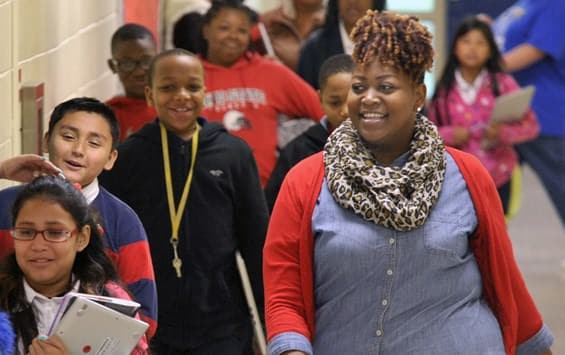School buses cranked their engines and campus bells rang across Charlotte today as most of the nearly 146,000 students enrolled in Charlotte-Mecklenburg Schools returned to class for the 2015-16 academic year.
Every school year is a beginning for CMS, a fresh start similar to the way football teams think about a new season. But there are major questions hanging over the school district as classes begin—some with immediate impacts and others with long-term implications.
Will the school board hire a superintendent before final exams?
We have reported previously on the slow search process for a permanent leader to take over from Ann Clark, who is planning to retire in June. A new superintendent likely wouldn’t officially start until the beginning of a new budget year on July 1, but the search process will play out across the school year. Finalists are typically brought to Charlotte for interviews with district staff, meetings with key community stakeholders and tours of CMS campuses.
The vision those candidates articulate and the personalities they display while in town will be important factors in the school board’s decision on whom to hire. But board members have said they want to be methodical and find the right fit. Will that take through the academic year and into the summer?
How will the community respond to CMS’ student assignment review?
Although CMS won’t complete its student assignment review this school year—the current target for a decision on attendance boundaries is November 2016—much of the framework for the process will be established during the next nine months.
Will the school board use student assignment to address issues of poverty, race, and inequality in this community? Or will it narrowly construe the process and make relatively minor boundary shifts?
I’m also interested to see how social media plays a role in student assignment. The ways in which parents, community advocates, and the school district are able to connect and share messages are far different this year than they’ve ever been. Will that make it easier for CMS to communicate its vision for school boundary lines? Or will it create more noise that is potentially toxic? I noticed one school board member who had to use Facebook last week to tamp down rumors—false ones, at that—spread by parents about possible student assignment shifts from one high school to another.
Will “Opportunity Scholarships” take hold in Charlotte?
Since the North Carolina Supreme Court validated the Opportunity Scholarship Act, low-income families will be able to seek money from the state to send children to private and parochial schools.
While supporters and critics of the so-called voucher program have watched it with great intensity, the program itself has received little attention in the Charlotte community at large. Most of Mecklenburg County’s private schools are far more expensive than the $4,200 provided annually by the Opportunity Scholarships.
Charter schools have grown tremendously in this region, but very little attention has been given to private school vouchers—from parents or the community as a whole. Will that change now that the court has ruled the program may continue and now that the General Assembly is considering expanding taxpayers’ financial investment in it?
What impact will a final state budget have on CMS?

When the General Assembly finally agrees on a budget, it will require CMS to scramble in one way or another. Will the district have to hire dozens of new teachers to staff the classrooms created by the state’s decision to reduce class size? If so, where will those teachers come from?
Or, would CMS have to lay off hundreds of teacher assistants because funding for those positions will no longer exist? If so, what impact will that have on classrooms that begin the year with teacher assistants?
Of all these questions, this is the one with the most immediate—and potentially most painful—effects. No matter how the state budget situation is resolved, CMS will have to make staffing changes, which parents and students will feel most acutely. The district has been planning for this possibility all summer, but no plan, no matter how close to perfect it may be, can satisfy every family or employee.
Will there be a surprise?
If the Charlotte community can agree on the desired outcome of any of these questions, it’s this one—and folks here hope it’s a resounding, “No.”
Take last school year, for instance. In a period of a couple months, Charlotte-Mecklenburg saw the introduction of and campaign for a surprise sales tax referendum to fund public education, the surprise closure of two area charter schools, and the surprise resignation of the CMS superintendent.
Previous school years have seen plenty of transition, too, from budget cuts and layoffs to leadership shakeups.
The CMS staffers and public education advocates I’ve spoken with recently have all made a point to say they hope this school year is turmoil-free. Of course, no one can make that happen, and it’s safe to say something will pop up between now and final exams that will shock most observers. But the community is collectively hoping for a school year in which policy and politics take a back seat to academics.
We’ll find out in June if their wish becomes reality.



